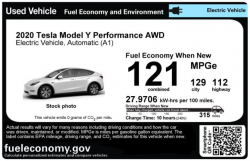
— A Tesla range lawsuit alleges Tesla Model 3, Model S, Model Y and Model X vehicles are advertised and sold with "grossly overvalued" driving ranges on single battery charges.
The California class action lawsuit accuses Tesla of false advertising of its electric vehicles and how many miles a vehicle can travel before a driver must recharge the battery.
The Tesla range lawsuit was filed by three vehicle owners who contend the vehicles are sometimes advertised 26% above the average range of the Tesla vehicles.
The Tesla driving range class action lawsuit currently includes:
"All persons in California who purchased a new Tesla Model 3, Model S, Model Y, and Model X vehicle."
The Tesla range lawsuit wasn't filed until after a July 2023 story from Reuters titled, "Tesla created secret team to suppress thousands of driving range complaints."
According to the driving range lawsuit, Tesla sells more electric vehicles by advertising a range far above what owners will truly get in the real world.
Customers assert they noticed driving ranges lower than advertised as soon as they purchased the Tesla vehicles.
"As some owners grew concerned, they contacted Tesla to schedule service appointments to confirm whether anything was wrong with their electric vehicle or its battery. However, many consumers who complained or scheduled appointments with Tesla regarding the below-advertised ranges in their vehicles discovered that Tesla would cancel such appointments and would explain that their electric vehicle was performing as intended." — Tesla driving range lawsuit
Tesla customers are allegedly told not to fully charge their vehicles, yet the advertised range is based on a fully charged battery.
The Tesla class action alleges it's impossible to get the advertised range on a single battery charge if a vehicle owner is told not to charge the battery to 100%.
The plaintiffs contend a driver will lose hundreds of miles of electric driving range by limiting the battery charge to 80%.
Each Tesla vehicle is allegedly sold with a suggested battery charge limit, but a driver can manually override the charge limit. However, the range lawsuit alleges Tesla recommends that an owner not exceed the suggested charge limit.
According to the class action, Tesla specifically suggests owners, “[c]harge the battery to the appropriate charge limit for your vehicle based on the installed battery.”
The Tesla range class action lawsuit was filed by these three vehicle owners:
- James Porter / California / 2022 Tesla Model Y Performance
- Bryan Perez / California / 2021 Tesla Model 3 Long Range
- Dro Esraeili Estepanian / California / 2022 Tesla Model 3 Long Range
The Tesla range lawsuit was filed in the U.S. District Court for the Northern District of California: Porter, et al., v. Tesla, Inc.
The plaintiffs are represented by Milberg Coleman Bryson Phillips Grossman.




